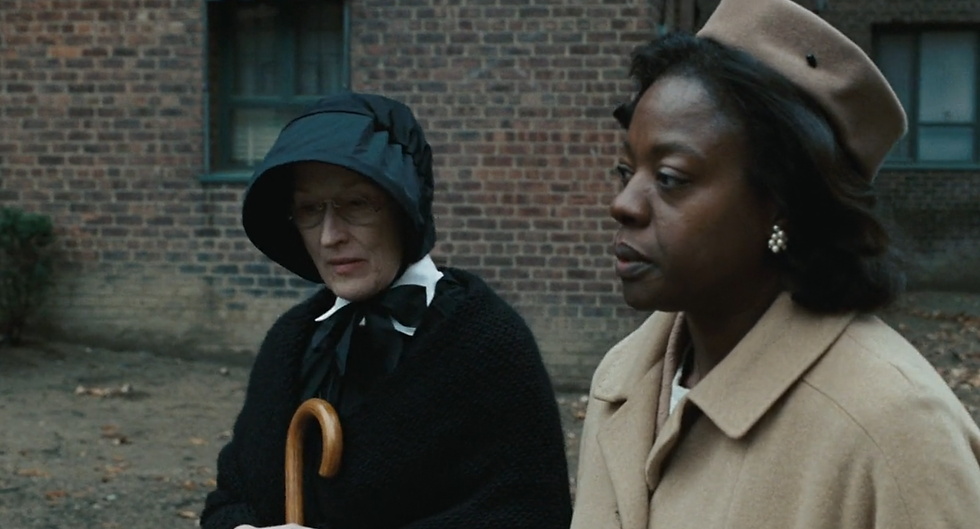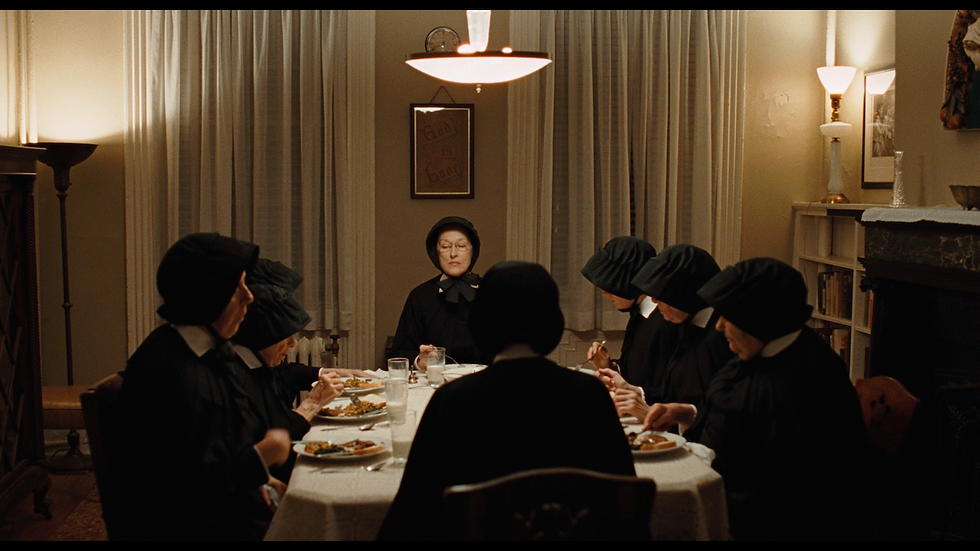"It Takes a Cat": Doubt - From Stage to Screen
- Fiona Craughwell
- May 22, 2021
- 4 min read
Doubt, a film frequently broadcast on television, was nominated for many awards, including many Oscars, but won few of them. However, it is a film that I feel is still somehow overlooked. I come back to it time and time again. The first time I watched it, I was left in awe. I knew it was one of the best things I had ever seen, but I could not pinpoint exactly why. This is a question that I am still wrestling with. Maybe I will find the answers here and maybe I won’t, but, hopefully, I will convince others to check it out.
Written and directed by John Patrick Shanley, Doubt was a play before it was adapted for the screen. Now, firstly, I have always been interested in plays that are reworked for cinema. Obviously, the two media are extremely different. In a play, you are mostly telling your audience your story. In a film, you are mostly showing them. You could suppose that most plays that are rewritten to be a film run the risk of being too dialogue-heavy or dependent on long dramatic speeches; after all, there are only so many monologues a person can listen to in one sitting. Doubt manages to avoid this dilemma, though.

Yes, it has many dialogue-intense scenes and, much like a play, it is reliant on powerful performances. Still, there are interesting and important moments that interrupt the theatrical atmosphere, punctuating and adding to such scenes. While some of our most important characters are talking, they are sometimes interrupted by a lesser character, by something in the room or by the decision of another character, such as what chair they choose to sit in. Almost all of these interruptions are important to the plot and reveal another layer to our main characters and the narrative. There is little action in Doubt. It is mostly conveyed by speech, but the film still manages to show the viewer its story. This is achieved using a combination of character, tension and these important interjections that keeps our grip for the film's more dialogue-heavy scenes.
Now this will sound like a contradiction, but I just adore the dialogue in this film. I know some people like more action and less talking and, for that reason, an interruption or two is beneficial, but I could have listened to these characters talk all day. Shanley needs to be commended for both these characters and his dialogue, and I will start with the latter.
Doubt has the sophistication of any crime film or psychological thriller, but it deals with morality, not murder or espionage. For a film about the priesthood and the dynamics of the church, this film builds tension better than most films I have ever seen. The way these films build tension is due in part to the characters, but mostly to the writing. I think one of the best ways to explain is to give an example. During one of the most intense scenes, just as the conversation is coming to its climax, the phone rings and continues to ring as the conversation progresses. Tension is achieved through this dialogue and is enhanced by such subtle actions. Knowing when the phone should ring and when the characters should have our undivided attention is the skill of a wonderful writer. Not bad for a film about nuns and priests, and with only four main characters.

Returning to the characters, not only are they written unbelievably well, but every performance is incredible. For me, there is a greater challenge brought to an actor when they are playing a priest or a nun. Maybe it's the fact that their appearance is so pared back and lacking in personality, so their portrayal of a character to the audience falls solely on their performance. The amazing tension present in this film is achieved equally by all four characters as their personalities each contribute to the story in their own way. Each character approaches the film's main drama from a different viewpoint. While the film's setting never changes, the characters within the space do and this is reflected in both their dialogue and each actor's performance. The dialogue matches each character. For one, it is sharp and quick-witted; for another, it is innocent and kind; and for a third, it is poetic and superior. Philip Seymour Hoffman, Amy Adams and Viola Davis should all be commended for their performances, but, of course, it is Mrs. Meryl Streep that steals the show.
Her character's main goal in the film is to get to the truth. Ireland knows all too well the desire of many to keep wrongdoing within the Catholic church a secret, but Streep's character is a rogue agent. This alone adds an interesting dynamic to the story. The film's most tense scenes often start off as normal conversations, but they build and build to an emotional climax. Streep's performance and character force all of those around her to reveal the one thing that they don’t want to be revealed, which ultimately reveals the truth.

The film is as gripping as any thriller, though we never leave the school and some of our main characters are only present for one or two scenes. The film's ending is not as divisive as the ending of some other thrillers, such as Shutter Island or Inception, but, like them, it can mean one of many things and it is up to the viewer to decide which.
This film should ultimately be watched just for the story itself. It is about what it says it is: the line between doubt and certainty. Films such as this and Benedict Andrews's Una raise interesting and possibly taboo topics about abusers and abusive relationships. This film is full of moral questions and dilemmas that you will find yourself pondering on long after the film has ended. It also looks beautiful. Its pallet is cold but very aesthetically pleasing.
Doubt is a truly genius film. Its story is slow and steady. It is a quiet film, but it will have you gripped from the first scene. The way this film creates tension should be taught to writers and film students everywhere. Its dialogue is stunning. Its characters and the actors portraying them are incredible. Its themes, its moral questions and its unique take on such themes make it truly original. Doubt will have you feeling that something is lurking in the background, behind us all, ...or is there?






Comments